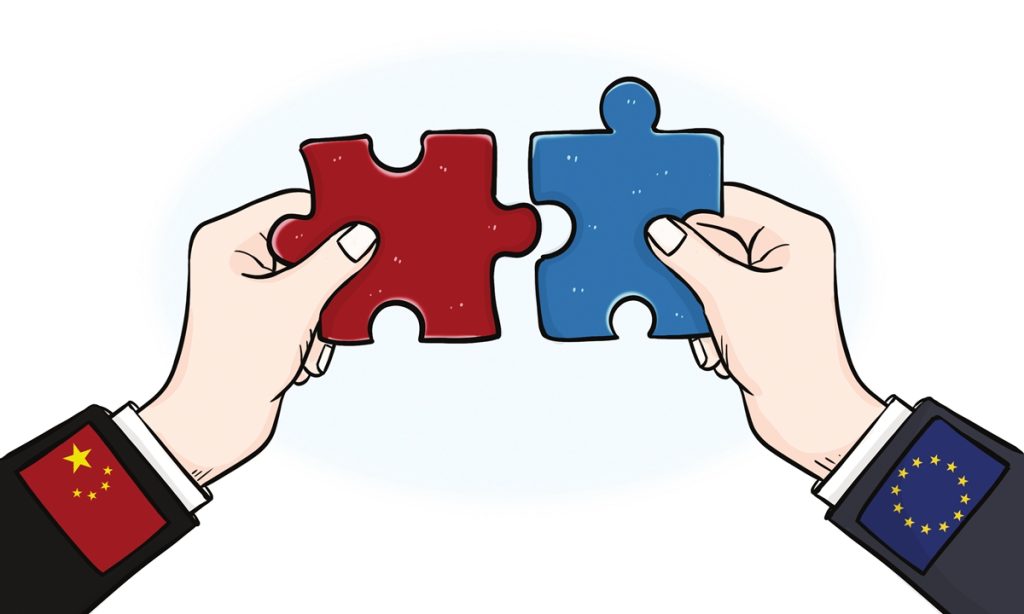A frank, sincere China-EU dialogue urgently needed on economic, trade issues: Global Times editorial

The 10th China-European Union High-Level Economic and Trade Dialogue will be held on Monday in Beijing. As the highest-level dialogue mechanism in the field of trade and economic cooperation between China and the EU and one of the "three pillars" of China-EU relations, the Dialogue has always been the main channel for the two sides to resolve misunderstandings and differences through the promotion of economic and trade cooperation. The Dialogue resumed offline for the first time in three years is a positive signal for the improvement of China-EU relations.
For both China and Europe, this year's Dialogue is different from the previous nine ones. At present, the two sides are obviously facing a greater number of issues, disputes, disruptions and challenges in the field of economic and trade cooperation compared to the past, while the total volume of trade between China and Europe has reached more than 800 billion euros ($853 billion), a new high that involves huge interests. This highlights the urgency for China and Europe to meet halfway and address these problems. Some already existing and newly emerged problems during the COVID-19 pandemic will also be discussed during the 10th China-European Union High-Level Economic and Trade Dialogue.
The dispute and division points between China and Europe on economic and trade issues are obvious. Executive Vice President of the European Commission and Trade Commissioner Valdis Dombrovskis, who came to China to co-chair the Dialogue, talked about the main concern of the European side during his visit to China in the past two days, which is the "very unbalanced" trade with China. Last year, the trade deficit between the two sides reached nearly 400 billion euros, and EU Ambassador to China Jorge Toledo called it "the highest in the history of mankind" with exaggeration.
It is well-known that the causes of the trade deficit are very complex. China is not willing to see the trade deficit grow too huge and has always hoped that the two sides will work together to push for a trade balance. In this way, the bilateral trade can be more sustainable. However, the European side simply attributes this to China's "trade barriers," which is completely untrue and unhelpful in solving the problem.
From the perspective of the Chinese side, what we see is completely different from the European side. The EU has been talking about "de-risking" on various occasions for a long time, and officially launched the European Economic Security Strategy in June this year, which is essentially a systematic "de-risking" strategy. Whether it is the recent announcement by the EU to launch an anti-subsidy investigation against Chinese electric vehicles, or the statement in June claiming that Chinese 5G suppliers Huawei and ZTE pose "materially higher risks than other 5G suppliers" and threatening to take corresponding measures, as well as the successively introduced European Chips Act, Foreign Subsidies Regulation, and EU's draft Critical Raw Materials Act, etc., all these acts are examples of trade protectionism. In other words, the European side has labeled acts and policies of trade protectionism as "de-risking," and the two can be considered equivalent in practice.
The European side has repeatedly assured the Chinese side that "de-risking" does not mean "decoupling." We believe that they are sincere in saying this. However, we cannot accept and strongly oppose the use of trade protectionism to "de-risk." The EU has always been an advocate of globalization and free trade. In the face of global changes, it needs to take practical actions to prove that it has not changed and learned from the mistakes made by Donald Trump.
It needs to be emphasized that having differences is completely normal, which also reflects the necessity of high-level dialogue between China and Europe on economic and trade issues. The key is to prevent the escalation and deterioration of these differences into conflicts and confrontations. Dialogue requires sincerity and the genuine expression of each party's positions and interests. More importantly, it is essential to seek common ground and solutions to resolve differences and problems based on this foundation. If dialogue only sees participants talk past each other, it loses its main significance. As some European individuals have pointed out, the worst thing for China and Europe in the current situation is to stop talking to each other and enter into a logic of group confrontation.
In terms of China-Europe economic and trade issues, the frontline enterprises from both China and Europe that are involved should have the most say. Some in-depth investigations by Western media have found that while European imports from China have declined, investment by European companies in China has increased. It is obvious that European companies have the most first-hand experience with whether the Chinese market is open or not. However, we have noticed that when making major economic and trade decisions regarding China, the EU is increasingly disregarding the opinions and interests of European companies. In this Dialogue, we hope that the EU could fully consider the feelings of European companies, break free from the constraints of general securitization and politicization, and resolve each other's concerns through dialogue and consultation. This is one of the most valuable experiences in the development of China-Europe relations and should not be overlooked in the current situation.